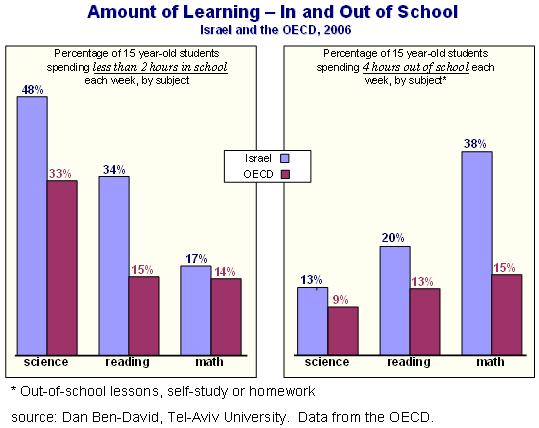|
PDF file
published
in Haaretz on September 21, 2008.
Learning the Education Basics
by Dan Ben-David What Jewish heritage and custom have
passed along from generation to generation, science began to prove during the
last century, and the organization of leading industrialized countries – the
OECD – began to internalize and assimilate in recent decades: education has the
ability not only to lift up the individual, it can also uplift an entire
society. Over the years, Israeli society
“progressed”, and what we progressively forgot, the OECD is teaching us anew –
the hard way. Several years ago, the OECD began to
examine how much its kids knew in some of the educational fields so basic for a
modern society and economy. In the most
recent such examination – PISA tests administered to 15 year-olds in science, mathematics
and reading – the Israeli students were ranked below 28 of the 30 OECD member-countries. As if this were not enough, gaps in
educational achievement in Israel were the highest among all of the countries
taking part in the exam. The question is
why? What do the other countries do that
is so absent here? In contrast with the conventional
wisdom, OECD data published a few days ago show that the average number of
hours per year of total compulsory instruction time for 15 year-old Israeli
pupils is not low. Actually, the State
of Israel budgets more instruction hours than 19 of the 22 OECD countries for
which there is data. So why don’t the
children of Israel know the material? One reason, though not the only one, is
related to the utilization of the instruction time. As indicated in the figure, nearly half (48
percent) of Israel’s 15 year-olds receive less than two hours of science in
school per week. This compares with just
one-third of the children studying less than two hours of science in OECD
schools. In reading, the share of
Israelis studying under two hours in school (34 percent) is more than double
the OECD share (15 percent). The
mathematics numbers are also unfavorable to the children of Israel: 17 percent
of the country’s pupils study less than two hours of math in school versus 14
percent in OECD schools. What’s going on here? On the one hand, we pay for much more
compulsory instructional time than is common in the West. On the other hand, our children receive much
fewer instruction hours in the basic fields.
Where does the remaining instruction time go? What exactly are we paying for? In fact, the number of pupils per
science teacher in the OECD is 13.4 as opposed to just 12.7 in Israel. In other words, we are not only financing
more instruction hours but are also paying for more science teachers than the
average OECD taxpayer. It appears that a
great deal of what enters the budget pipe on one end appears to perform an
inexplicable disappearing act on its way to the children who require it at the
other end. What the kids don’t receive in school
must ultimately be paid for, again, privately – though not every parent is
fully aware of education’s importance nor does everyone have the means to pay
for it. Instead of receiving instruction
on the basic subjects in school, Israel’s children are forced to attain the
missing knowledge on their own. The share of Israeli pupils that
devote four hours a week on out-of-school lessons, self-study or homework is 50
percent higher than it is in the OECD in science and in reading (13 percent of
Israel’s children versus 9 percent in the OECD study 4 hours of science a week
outside their schools while 20 percent of the pupils in Israel versus 13
percent in the OECD do so in reading) and more than twice the OECD rate in math
(38 percent of the Israeli children versus 15 percent of the OECD kids study
four hours a week outside school). In light of all this, it should come
as no surprise when our children perform so abysmally in the international
exams. What the future holds in store
should also not surprise when today’s pupils in Israel and abroad grow up and begin competing with one another
in the global marketplace. This may be
the holy land, but miracles happen only to those who take control of their own
destinies. comments
to:
danib@post.tau.ac.il
|
